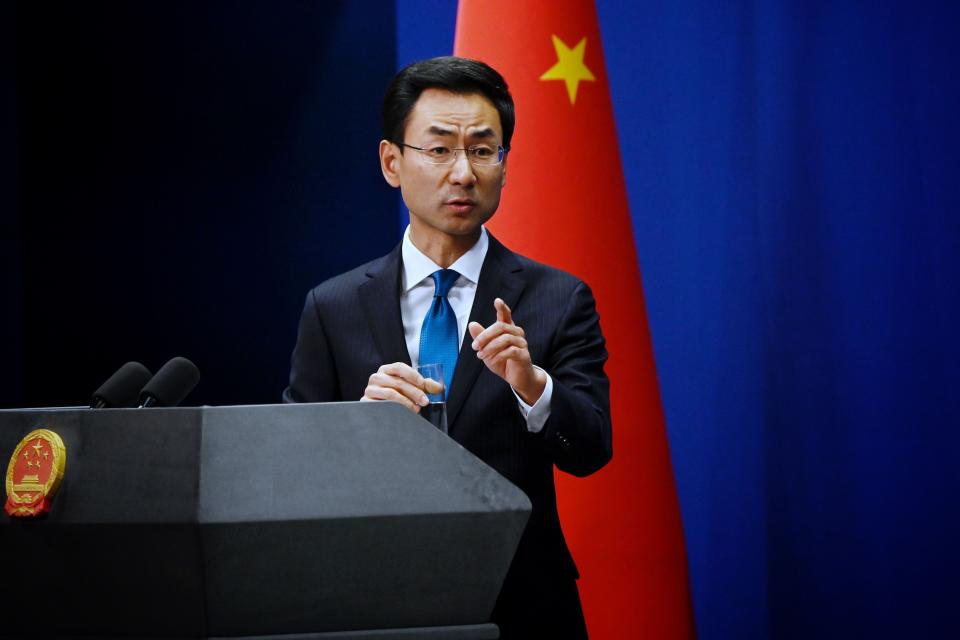China expels Wall Street Journal reporters over 'racist' headline on coronavirus op-ed
China's authorities revoked the press credentials and ordered the expulsion of three Wall Street Journal reporters Wednesday in retaliation for a headline on an opinion column about coronavirus that Beijing said was racist.
The Journal identified the journalists as Josh Chin, its deputy bureau chief in Beijing, and reporter Chao Deng, both U.S. nationals. Another reporter, Philip Wen, is an Australian citizen. All three were ordered to leave the country within five days.
At a regularly scheduled news briefing Wednesday, a spokesman for China's Ministry of Foreign Affairs said China objected to an essay published in The Journal's editorial pages earlier this month with the headline "China Is the Real Sick Man of Asia."
Anthony Fauci: Coronavirus risk is 'low for the American public'
"The editors used such a racially discriminatory title, triggering indignation and condemnation among the Chinese people and the international community," said Geng Shuang, the ministry's spokesman. He said China demanded The Journal apologize, investigate and punish those responsible for the story.

The column is a coronavirus-related piece by Walter Russell Mead, a professor at Bard College. It was published Feb. 3 and argued that "Chinese authorities are still trying to conceal the true scale of the problem" of the virus that has now sickened tens of thousands and killed more than 2,000 people. "China’s initial response to the crisis was less than impressive," Mead wrote. He could not be immediately reached for comment.
Like many American newspapers, including USA TODAY, the opinion pages of The Journal are run separately from the news department. This means that none of The Journal's news staff would have been involved in commissioning or editing Mead's column or writing the headline. Like most foreign media, The Journal is not available in China, and its website and stories are blocked by its so-called Great Firewall: censors.
"Our opinion pages regularly publish articles with opinions that people disagree – or agree with – and it was not our intention to cause offense with the headline on the piece," said William Lewis, CEO of Dow Jones, which publishes The Journal.
"Mature, responsible countries understand that a free press reports facts and expresses opinions. China should not restrict #freespeech," U.S. Secretary of State Mike Pompeo tweeted.
Death toll passes 2,000: Coronavirus 20 times more lethal than the flu?
The Foreign Correspondents' Club of China issued a statement on Twitter expressing deep concern and strong condemnation” of the Chinese move. It pointed out that none of the three reporters had any involvement with the opinion piece or its headline.
Chinese authorities have declined to issue or renew credentials for international journalists before, but this appears to be the first time in recent years that it has actively revoked credentials, effectively expelling the journalists from the country.
The incident comes a day after the Trump administration said it would begin treating five major Chinese state-run media entities with U.S. operations – Xinhua, CGTN, China Radio, China Daily and Hai Tian Development – as foreign embassies. It will require them to register their employees and U.S. property with the U.S. State Department. A similar U.S. Justice Department measure is in place for some Russian state-backed media working in the U.S. such as Russia Today, an English-language TV network.
Tensions between Beijing and Washington have fluctuated since President Donald Trump took office three years ago. The world's two largest economies have been locked in difficult trade talks that have precipitated on-and-off trade tariffs, and each side has accused the other of espionage. China is concerned about U.S. support for Taiwan, an island off China's southern coast that is governed independently but that Beijing claims as part of its territory.
The U.S. has expressed frustration about what it says it a lack of access to information about the spread of the coronavirus. The virus has infected more than 75,000 people in China and 1,000 outside mainland China.
Guide to coronavirus:Everything to know about COVID-19, virus alarming the world
This article originally appeared on USA TODAY: China expels Wall Street Journal reporters over 'racist' headline

